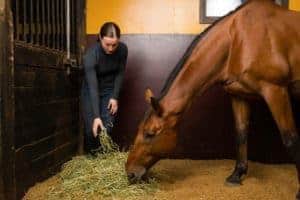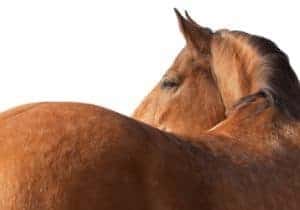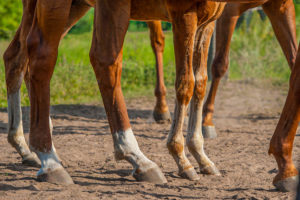
Understanding Mineral Supplementation in Equine Diets
Horses need a variety of minerals in their diet to support basic system function and overall health. Learn how to ensure your horse is receiving the minerals he needs.

Horses need a variety of minerals in their diet to support basic system function and overall health. Learn how to ensure your horse is receiving the minerals he needs.

Experts share feeding, grooming, and bathing tips to keep your horse’s hair coat gleaming.

What should and shouldn’t horses with heaves (or equine asthma) eat? A nutritionist offers advice.

Alimend, a gastric health supplement made by Vitalize, has helped ease an off-track Thoroughbred gelding’s gastric discomfort and keep it at bay over the past 15 months.

An equine nutrition expert addresses toplines, horse protein needs, and if whey is the way to go.

Vitamins and minerals comprise a small portion of the horse’s diet by weight, but their importance is enormous. Learn more about when supplementation might be needed.

Get tips for ensuring your horse gets the nutrition she needs without eating all your money.

Find out how to design an affordable feeding program while still meeting your horse’s nutritional requirements.

Find out how you can influence your horse’s behavior through feed management and ingredients.

This feed program appeared to improve one horse’s weight, skin, and coat and might have helped him avert gastric issues during a stressful situation.

Horses need the essential nutrient vitamin E for proper muscle and cell function. Here’s how you can be sure you’re meeting their requirements.

Probiotics might help reestablish healthy balances in the horse’s gut microbiome without causing harm.

Two equine nutritionists shed light on the do’s and don’ts of feeding your horse to promote strong and healthy hooves.

Understanding how these products work and what to look for on their labels can help you make the best decision for your horse.

Horses with PSSM1 might benefit from magnesium supplementation, but it is important to use the right form and reevaluate its effects on your horse periodically.

Discover how your horse’s diet plays an important role in optimizing his performance and recovery.
Stay on top of the most recent Horse Health news with
© 2022 Copyright Statement dolor sit amet, consetetur sadipscing User Terms, sed diam nonumy eirmod tempor invidunt ut labore et dolore magna aliquyam erat, sed diam voluptua. At vero eos et accusam et justo duo dolores et ea rebum. Stet clita kasd gubergren, no sea takimata sanctus est Lorem ipsum dolor sit amet.
"*" indicates required fields